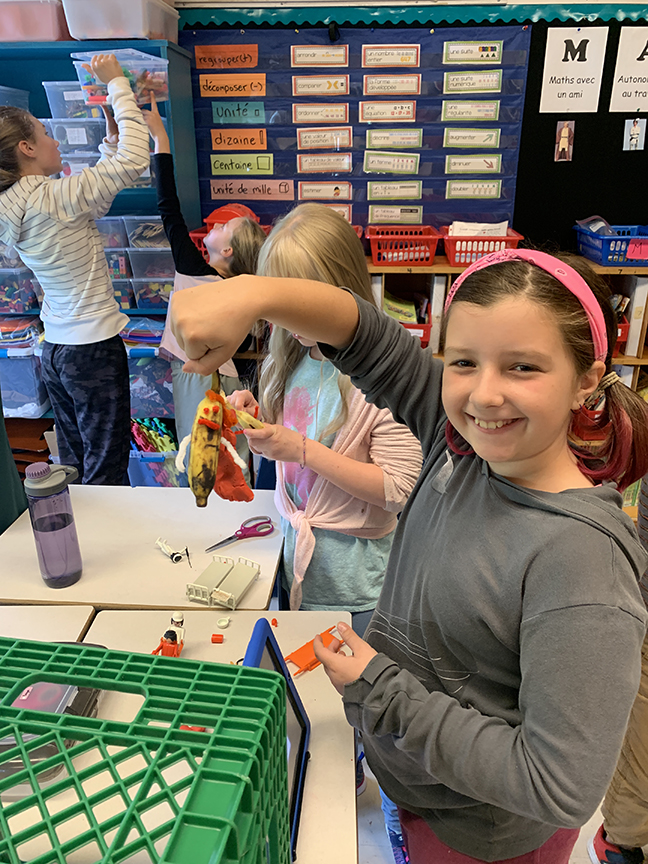
St. John’s, NL
We took the Activity # 3 Ugly Food Superhero concept and remixed it a little. Instead of making a comic strip, we used iPads to create stop motion videos of with the message of stopping food waste. Many students incorporated real fruit and veggies form a local grocery store that was going to be discarded as “super hero” characters in their work. We even tasted the food labelled as imperfect by the grocery store and concluded that it tasted good. The collaboration, message and quality of work was astounding for Grade 4. Students saved finished videos (en français) to their Google Drive to share with parents and friends in order to spread the message. Many pictures during this activity available.
Photo credit: Ashleigh Hudson
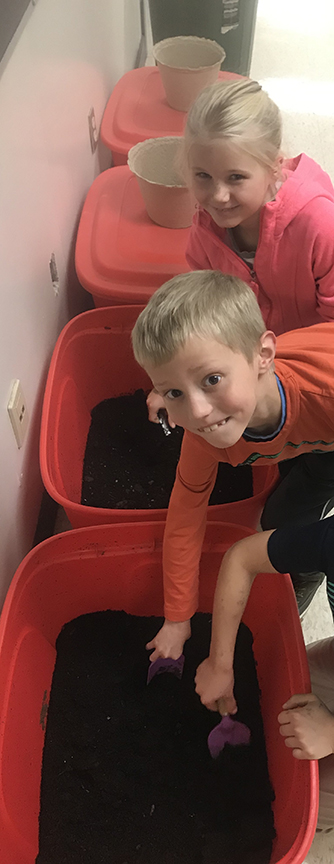
Nobel, ON
We have a small vermi-composting program at our school that we thought we could use as a springboard for a larger initiative. Starting in Oct we had an assembly to promote our Food Waste Free initiative and talked about where food waste comes from and how we can help eliminate it at school. We highlighted three areas for us to make an impact
1) Being part of packing our lunches so that we know what food we are bringing
2) Eating all of the edible parts of our lunch
3) Composting the inedible parts (pits, cores, peels) by donating them to a local farmer for feed.
Each class was given a compost pail and we collect and weight the compost at the end of each day so that we can determine how much food we diverted from the landfill.
Photo credit: Cameron MacDonald
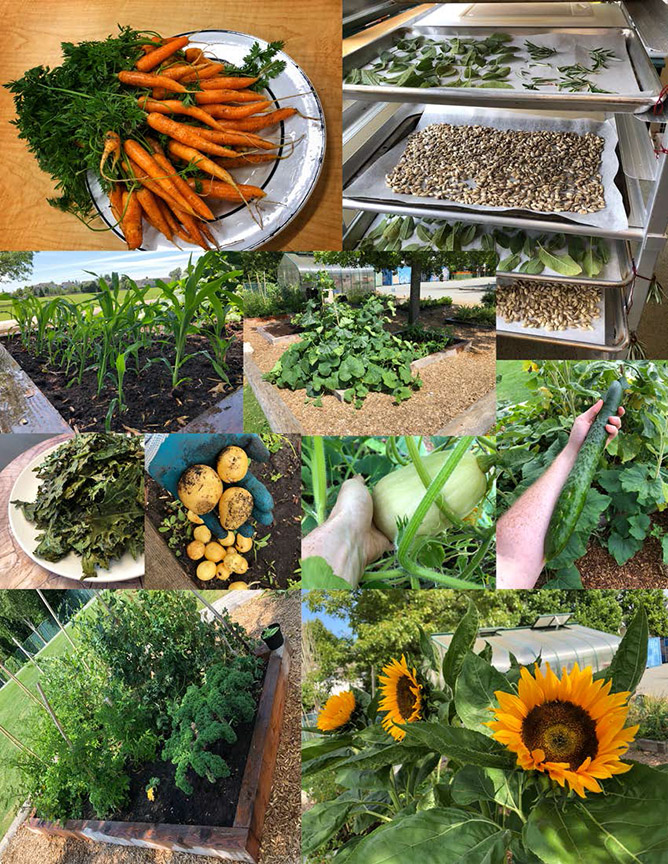
Richmond, BC
At our school we have put a very strong focus on growing our own produce. In the spring we planted peas, kale and beets that students and teacher were able to enjoy before the year ended. Over the summer, dedicated students cared for the garden as our warmer temperature loving plants grew (cucumber, tomatoes, and squash). Now that we have made it to fall, we were able to harvest lots of food, grown locally that our students could cook during foods class and enjoy. It was very important for us to show the value of growing your own food and how much work it takes. We also wanted students, teachers and the community thinking about where their food comes from, how it gets here and how their choices in the grocery store (or farmer’s market” can have drastically different effects on the environment. Our program was met with a lot of success and we will strive to continue this method of processing local food for it’s educational, environmental and delicious benefits!
Photo credit: Neill McCallum
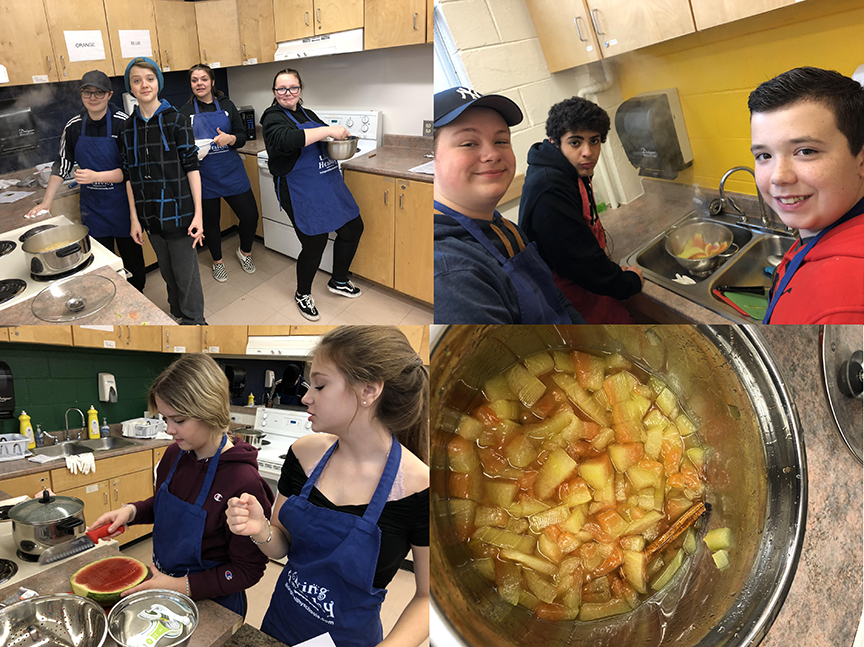
Mount Pearl, NL
Our school is always looking for new ways to improve both the environment and to help students making healthy/positive choices. We have a school garden and have just started an indoor hydroponic garden as well as composting this year with success, so to take on a new activity was a no no-brainer! I teach my science class home economics as well, which made the Action Kit activity of becoming a food innovator the perfect fit. The class discussed ways of saving food and then got down to business of saving the rinds off our delicious watermelon snack! Students not only got practical experience in the kitchen, but also got to see how science is involved and how we can change even the most inedible food into something good!
Photo credit: St. Peter’s Junior High
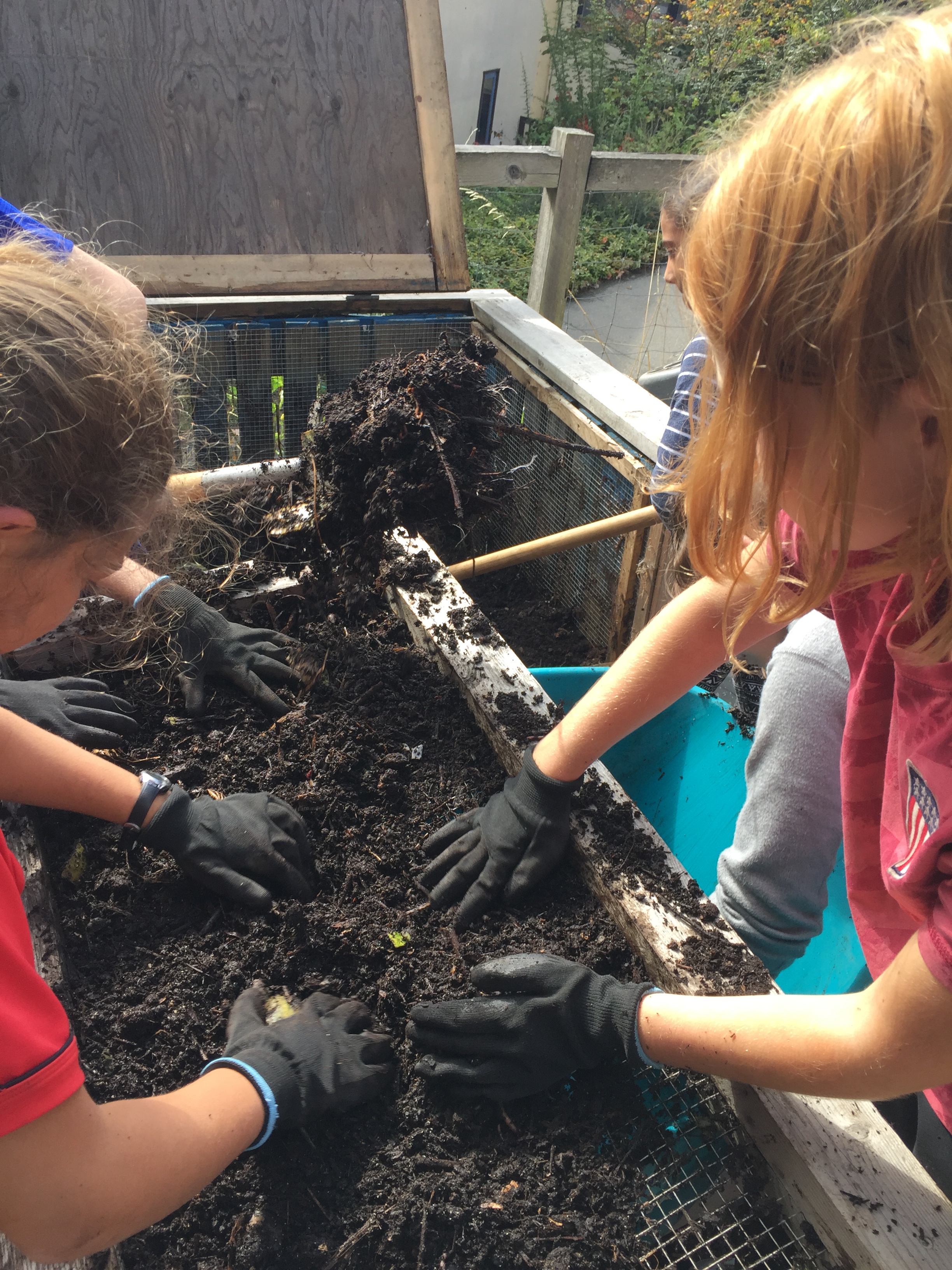
Salt Spring Island, BC
In our active school garden program, we organically grow, harvest and prepare foods in the garden. Around Halloween, every class helps prepare a dish or with some aspect of a giant all-school harvest lunch, which uses compostable dishes, napkins and reusable silverware. This year, it’s pumpkin squash soup (hand sourced by a class from a walkable-distance farm), along with school garden herbed biscuits, and local applesauce. All waste gets recycled into soil in our year-round compost system.
The school composts paper towels used in the classrooms along with food waste in our three-bin compost system. A garbage audit showed that each class produces about a garbage-can full of used paper towels each week! At the end of each day, students from each class dump their waste into the bins. Several classes also maintain worm compost systems. The final compost is used in the gardens to increase soil fertility and grow more food!
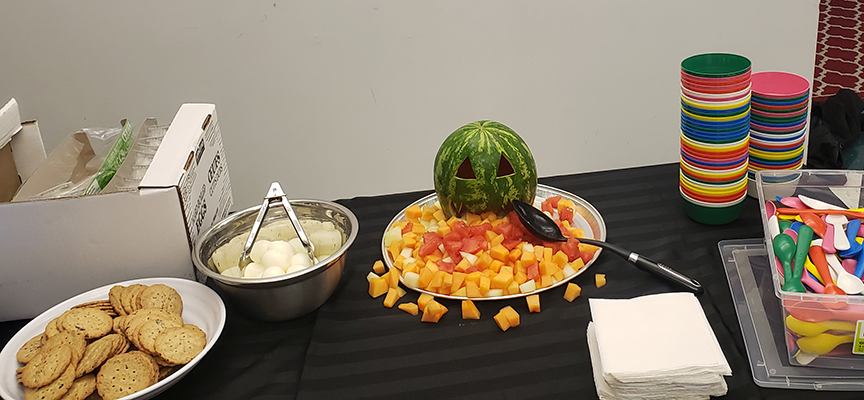
London, ON
In an effort to reduce our waste we purchased reusable bowls plates and Cutlery to replace the single-use plastic baggies to serve students their morning snack in.
Photo Credit: Cheryl Bovingdon
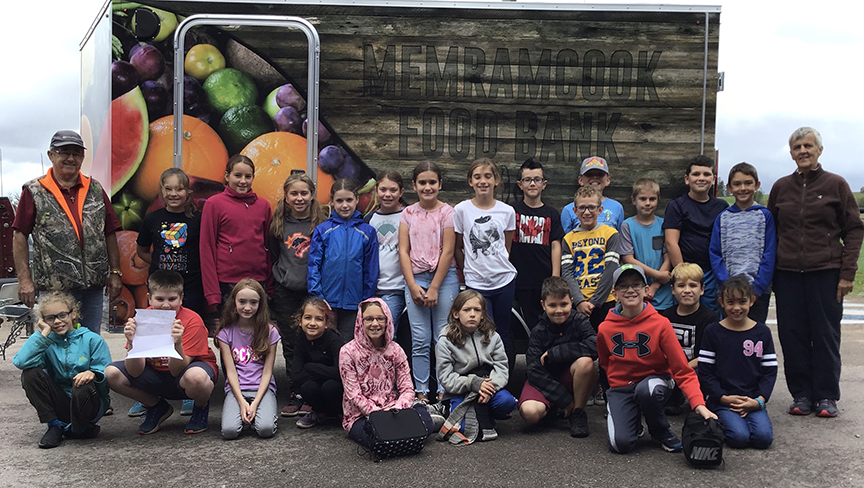
Memramcook, NB
Our activities started 5 months ago when we prep and planted our greenhouse and garden. Using broad forks and wheelbarrows, our students learned how to get the garden going using human power. A few of our former students work all summer tended the garden so that our students could start the new school year with a full garden and greenhouse. Full indeed! Our students where able to taste test many of our veggies. Our chocolate tomatoes are definitely our best seller! After, wanting to help our local community, some students suggested that we should give some to local charities… So we did:) Then came the time to start our salad bar with 80 percent of our veggies coming from our fields. And finally, we started our no packaging salsa snack sampling that is going to be sold at our student ran snack bar. 99 percent of our students wanted second serving after the salsa taste test. Our best results yet:)
Photo credit: École Abbey-Landry
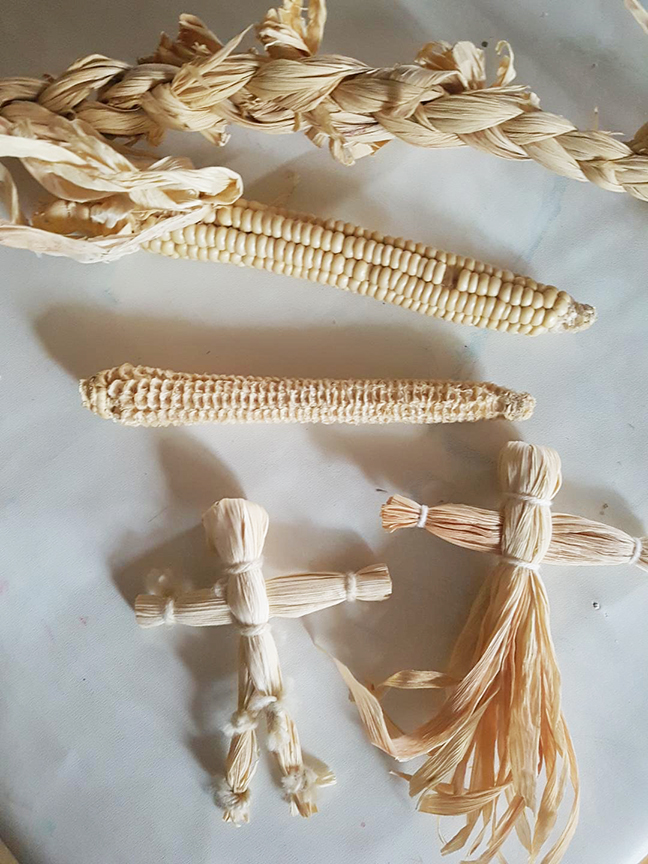
Tyendinaga, ON
Our school is a Mohawk language and cultural school. Our people have always strived to minimize waste and use every part of our resources. Corn husk dolls are a part of our traditional culture, so we knew we had to do that activity, especially since it is harvest time so there is lots of corn! We spent some time learning about our traditional white corn and we ground the kernels with a stone grinder and made delicious traditional corn bread. Most people would throw away the corn cobs and husks, but we used the husks to make beautiful dolls and we will use the corn cobs as kindling for a fire.
Photo credit: Kayenté:ri Emerald Lefort-Cummings
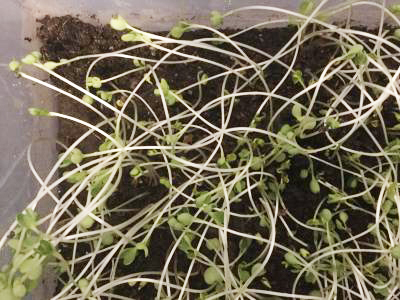
Vancouver, BC
Made a video telling people how to reduce food waste.
Photo Credit: Vincent Hui
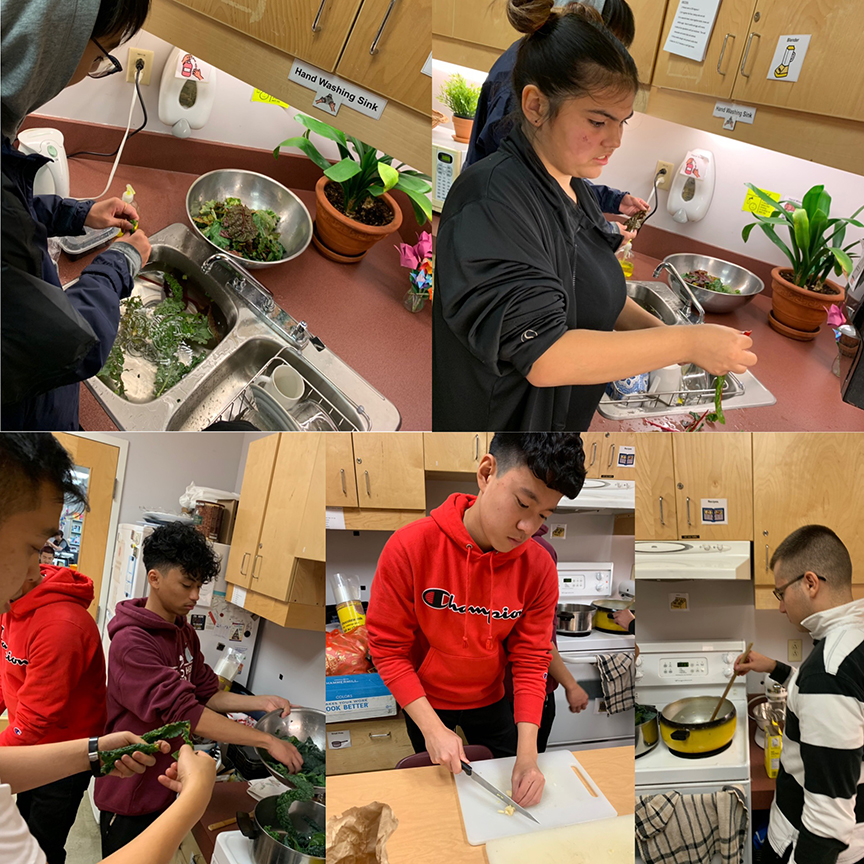
Richmond, BC
We harvested from our school gardens and cooked and ate garden veggies together with two classes. We also planted a new fall garden — spinach, radish, bokchoy, etc. Two of our classes is learning about worm compost and taking care of our compost worm bins– we are harvesting vermicompost from these bins as well to add nutrients to our garden. We are growing vegetables from seed in a Tower Garden indoors. Lastly, we are learning to freeze left over fruits and vegetables for later use.
Photo credit: Eugene Harrison
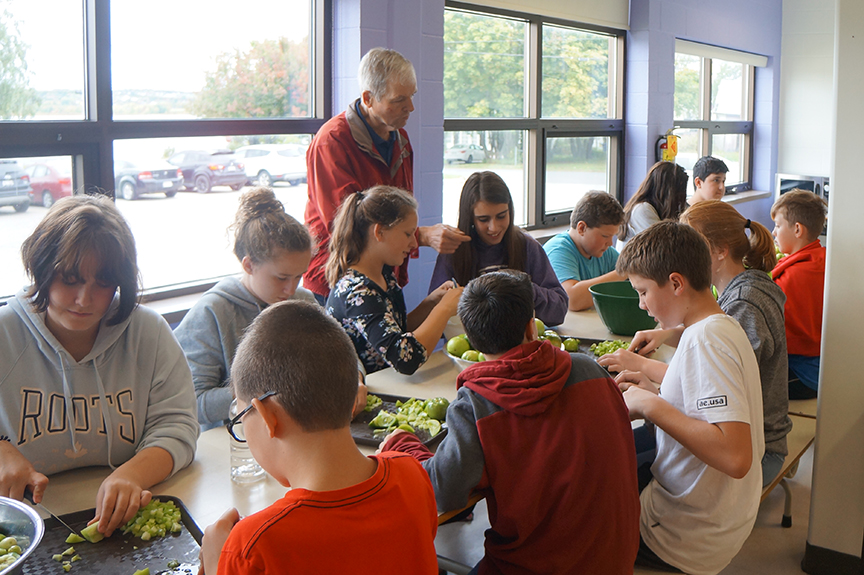
Miramichi, NB
Our newly started Garden Club wanted to teach our students the lost art of preserving. So we took our green tomatoes and onions and had some seniors from out community come to our school to share their recipes and talents. A few of our middle school classes participated in this and now understand how to make it and loved trying out new food as well. Then we had so much fun with this activity that we decided we would try to do the same with beets. What a successful experience for all to have this opportunity.
Photo credit: Nelson Rural students
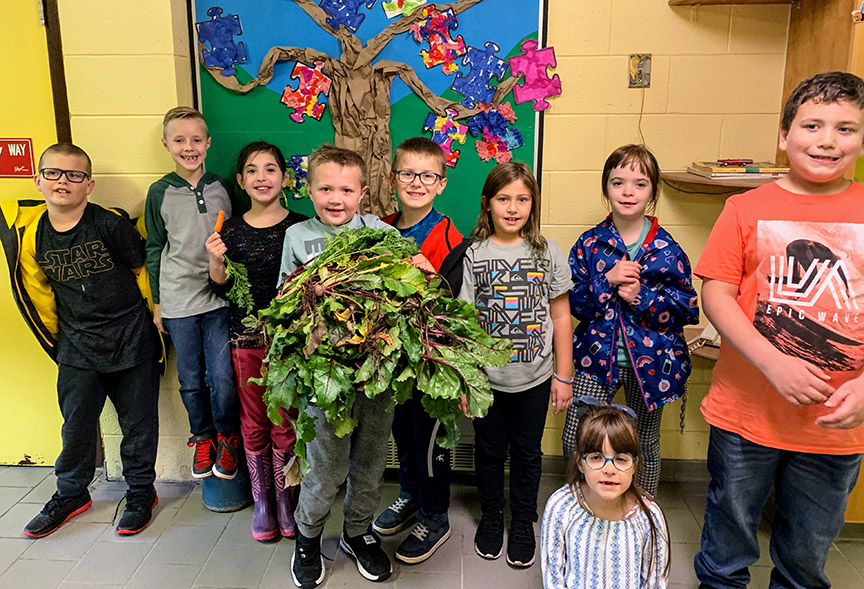
Triton, NL
To zero food waste this month our students have become food scientist. They have been learning to use everything from the leaves to the roots of the beet plants from their outdoor garden. They boiled beet greens for their Harvest Celebration, learned to make pickled beets for a lunch time snack and even used the beet peel to dye wool for a rug hooking project. The small scraps that were left over from the beets were used to feed our school’s vermicompost.
Photo credit: Laura Oickle
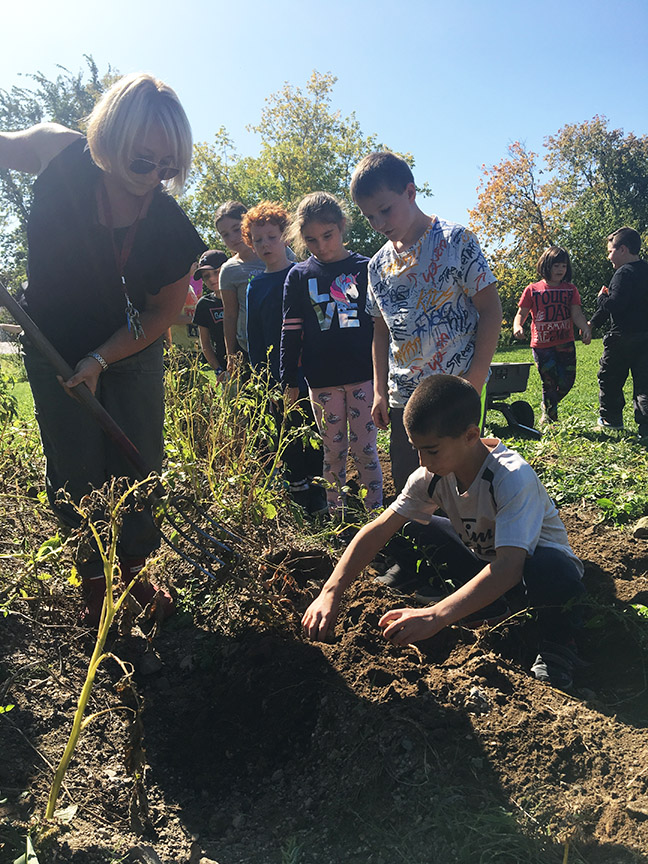
Miramichi, NB
Our entire school loves to help get our garden started in the spring! Each grade level help plant a seed indoors usually and then we go out to our garden and plant it before we leave. Some of us come out on Monday nights to help in the garden and then when we return to school we get to see how well our seeds have done. We helped this year to harvest the Potatoes from our garden and then sold them to our school’s teachers and families who wanted to buy them on Meet the Teacher Night. The food is always used somehow. The families who come to our garden during the summer always leave with a bag of fresh food.
Photo credit: Student Council at Nelson Rural
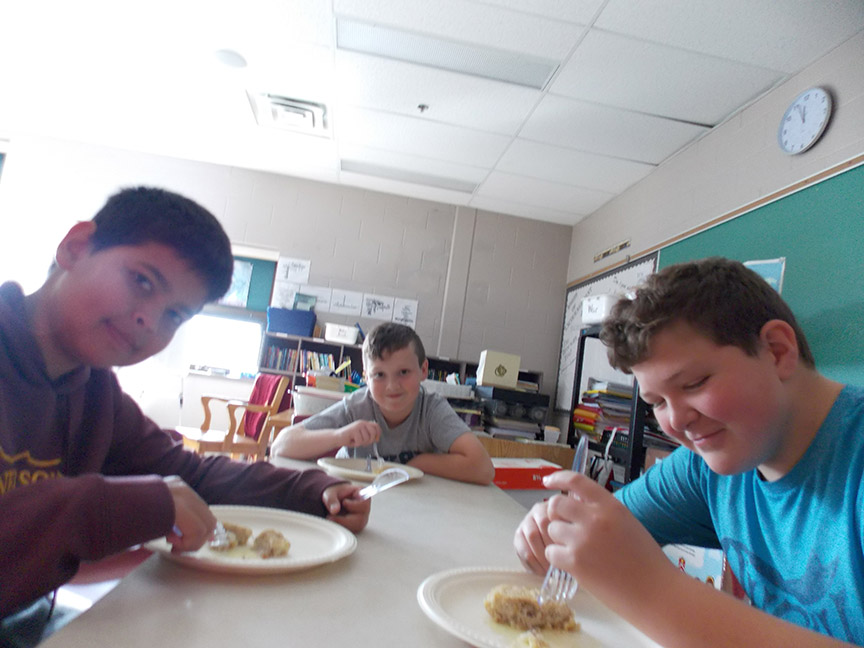
Miramichi, NB
Our newly formed Green Team prepared a bass and potatoe dinner with chow-chow our students helped to prepare with green tomatoes from our school garden. Our school is located on the bank of the Miramichi river and in the spring all students were given the chance to try their hand at bass fishing. Many students had never eaten bass of chow chow and this was a wonderful opportunity. We also had fish cakes the following day to eat up the left overs. Again many students had never eaten fish cakes. Our middle school student body of 83 were invited to share lunch with us and of that 25 participated.
Photo: Students enjoying fish cakes made from the leftovers of our Bass & Potato Lunch
Photo credit: Mrs. Murphy
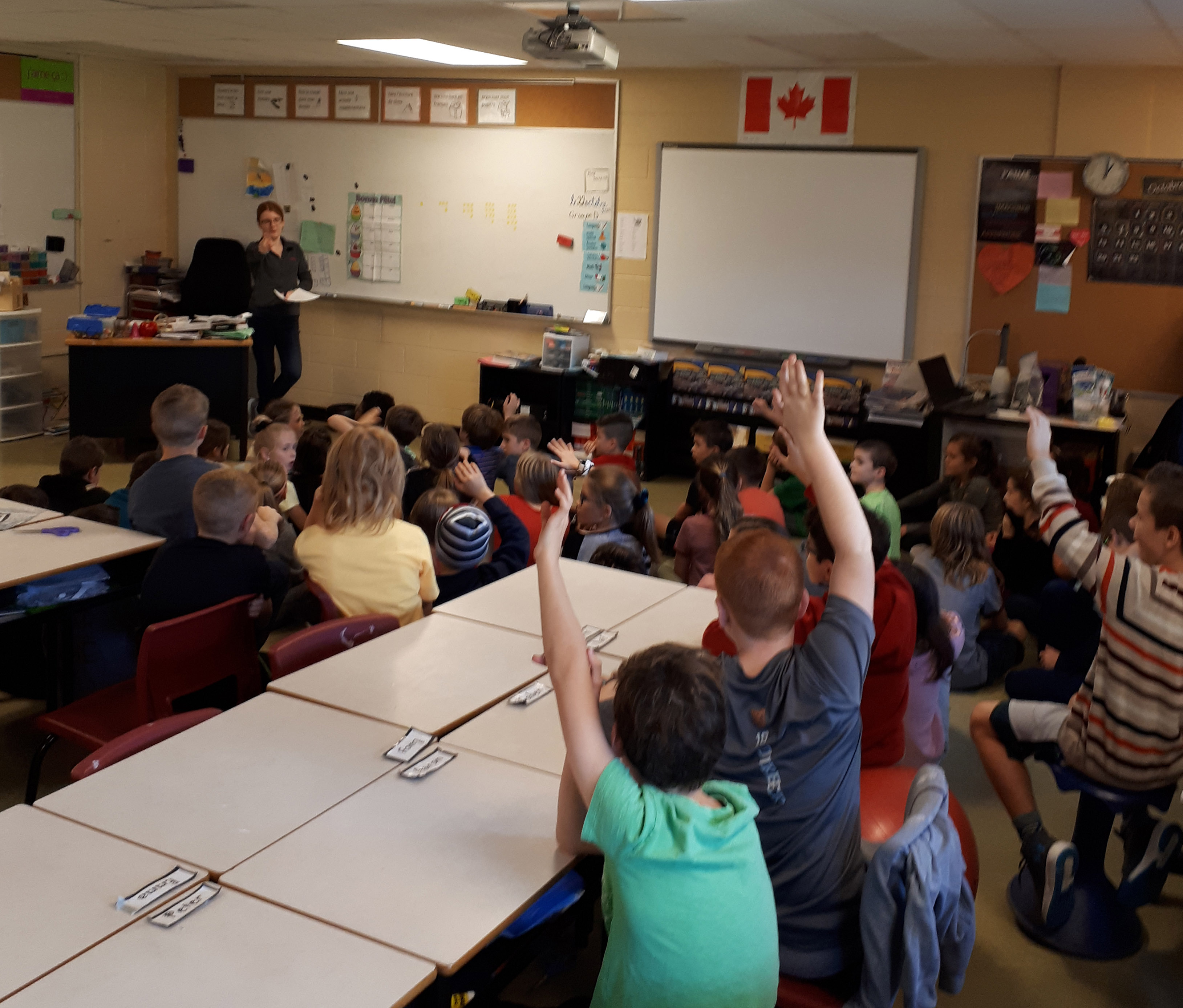
New Minas, NS
We invited a guest speaker, Emily Guptil, from the Practical Nursing Program at NS Community College to visit two of our grade five classes to share her knowledge of healthy eating and tasty nutritious food. She also participated in the lunch program and spoke with all of our students as they passed through the lunch line and salad bar.
Photo credit: Louise Hanavan
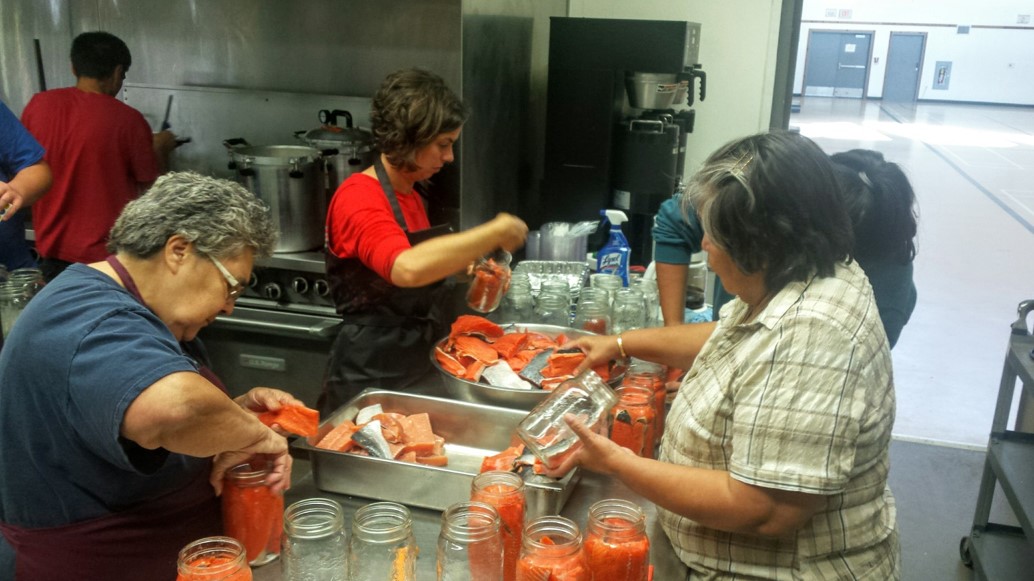
Masset, BC
we are hosting 20 salad bars that are aiming for locally grown foods that require minimal packaging
Kids choose the amount and type of food they want which minimizes waste
we will also revitalize our compost and move it into our garden beds to teach about the cycles of compost and soil development.
Photo credit: Sarah Stevenson
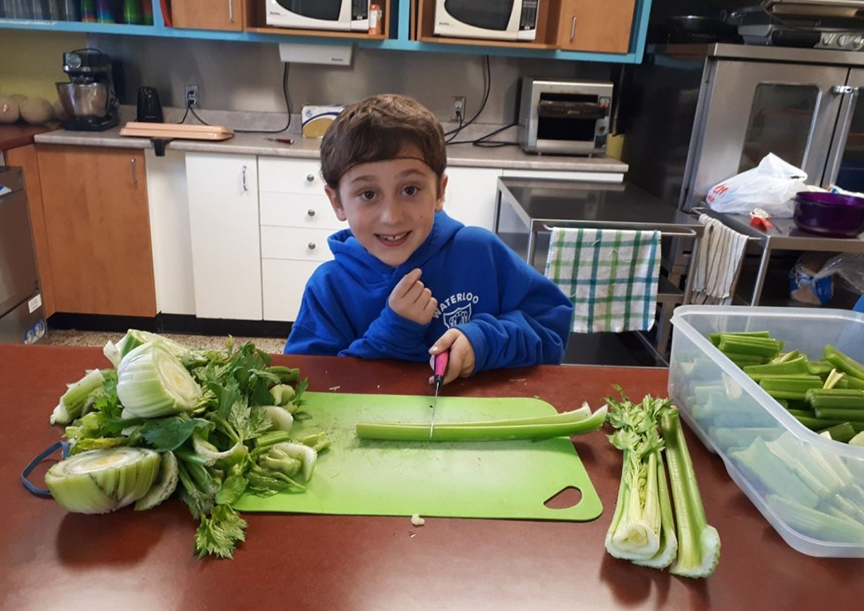
Waterloo, Quebec
Since the beginning of October, Waterloo Elementary is working hard to reduce the waste it places into the regular garbage bins. They have acquired a composting bin and all organic waste in the school is now disposed of into the compost. The students are actively participating by scraping their plates into buckets in the cafeteria and helping to empty these buckets into the compost. Posters have been placed beside the buckets to educate the students on the food items that can be composted. Students who help with food preparation in the cafeteria have observed the impressive impact of composting. There has been a significant reduction in regular waste. The whole school is actively participating and seeing the benefits!
Photo credit: Jenny Wheeler
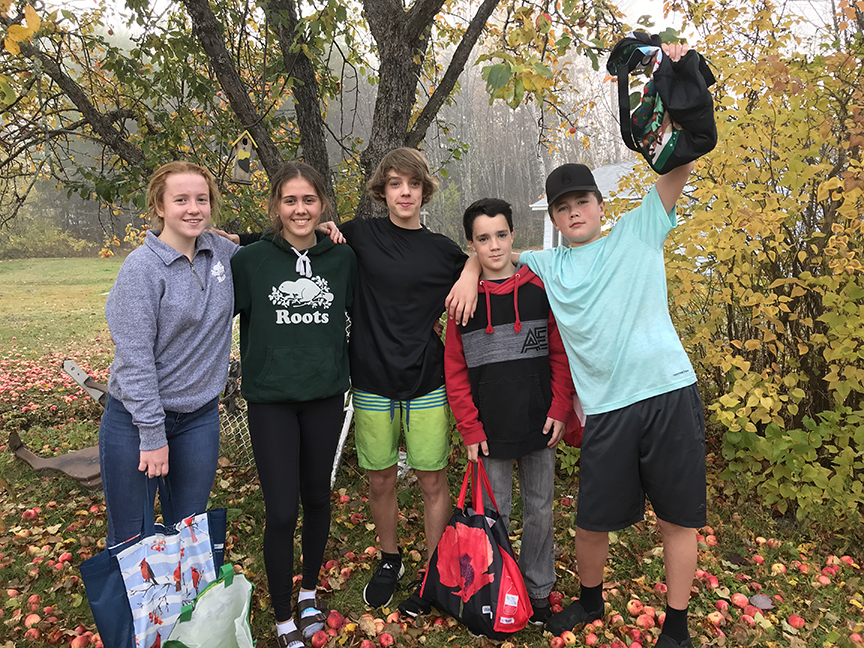
Miramichi, NB
We took a group of 5 students to a local seniors home and picked apples from the ground. These were “less than perfect” fruit which would have went bad. We made an Acadian desert which we shared with the entire primary wing as part of a French cultural activity using the apples. We boiled the peelings to make apple jelly which will be sold to help fund further projects and pay for the materials for this one. The apple cores were returned to compost.
Photo credit: Denise Murphy
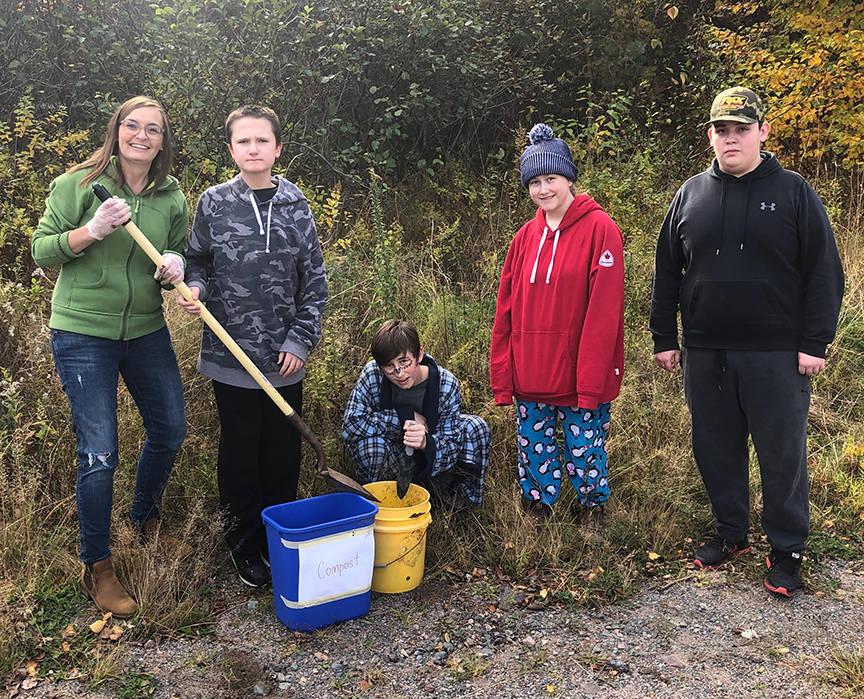
Avondale, NL
We completed the Composting Community Activity. We recently initiated a composting program at our school. We installed compost bins in the cafeteria, staff room and on each floor in our school. We started by educating the students on what composting is and why it is important. We explained what students could and could not compost and we attached signage around the bins so that everyone would know what to put in the bin. Our pervasive needs science students are currently running the program. They clean out the bins and add it to our compost daily.
Photo Credit: Kimberley Jones
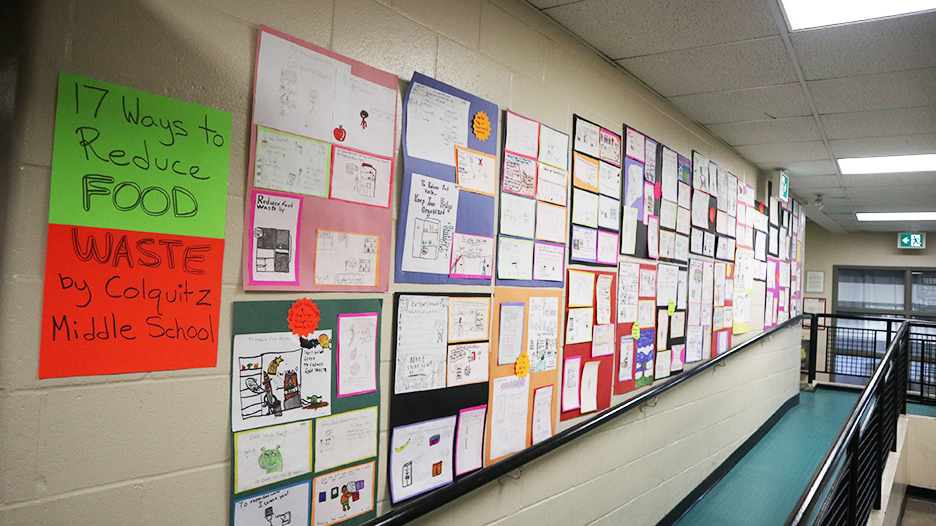
Victoria, BC
17 ways to reduce food waste: 240 students made bright colourful infomercials about their chosen topic. The infomercials were gathered by waste reduction topic onto 41 posters. These posters were put up at a local recreation centre near the reception area for many more people to see and get informed. Food Waste creates methane gas which is 25 times worse at creating greenhouse gases than Carbon Dioxide. This is a topic tweens and teens can personally do something about! Eat food, don’t throw it out!
Photo Credit: L-L Helton
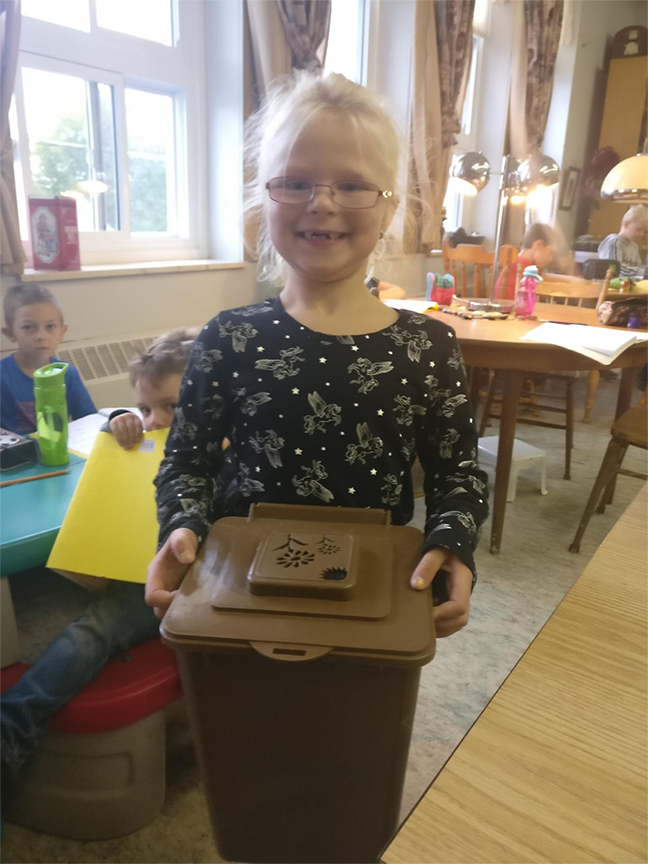
Thetford Mines, QC
À chaque jour de classe, nous allons ramasser les déchets organiques de la classe. Noua utilisons une poubelle brune pour différencier le type de déchets. À la fin de la journée, j’apporte chez moi la poubelle brune. Comme nous utilisons 3 types de déchets les enfants sont sensibilisés aux types de contenants ou/et déchets.
Photo Credit: Laurie St-Pierre 1ere année classe de Mme Chantal Nolet
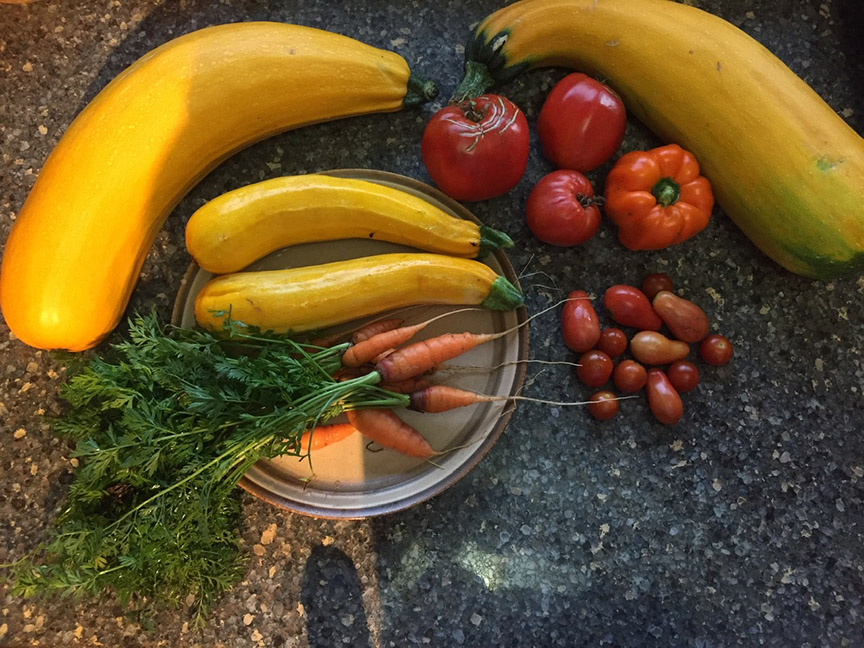
Sharbot Lake, ON
We already work hard to reduce waste, recycle, and use less energy. We needed to change the way we bought food for the snack bins, though. We challenged ourselves to look at the packaging of snacks, single use plastics, and juice boxes, to start. We looked at using juice jugs instead of wasteful tetrapacks. We looked at buying local, in season produce in place of packaged fruit snacks. We pushed the children to use their refillable water bottles, and composted food or donated it to Mrs. Beckstead’s chickens and rabbits. We harvested our kale and froze some for smoothies in the dead of winter. Overall, it’s just a start, but we are feeling good about our efforts to reduce food waste and support local!
Photo Credit: Lori Beckstead
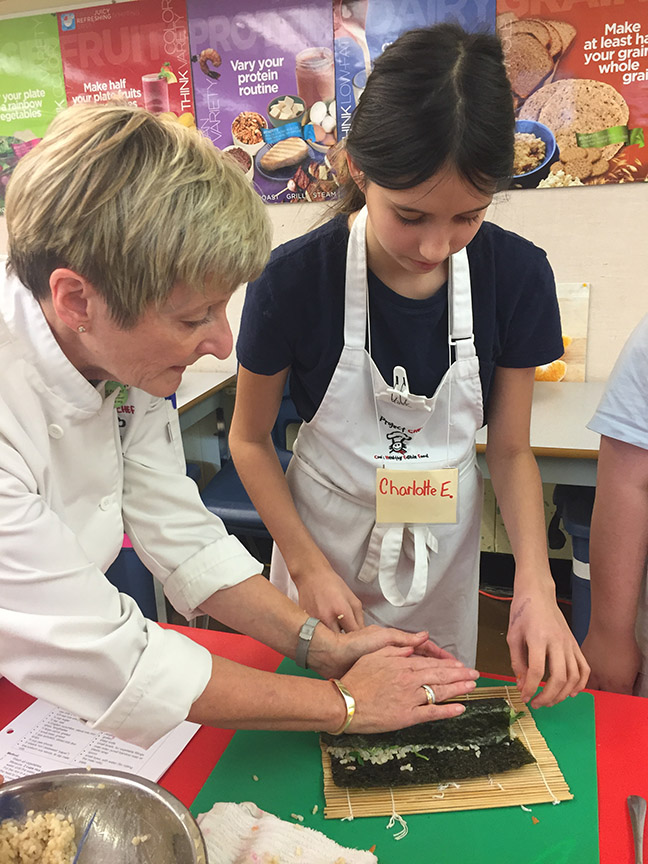
Vancouver, BC
Participating in Project Chef has been a wonderful way to kickstart our focus on Food Security. The Project Chef team weave healthy eating practices with culinary skills while teaching issues related to food security. The location of the farm which sourced the potatoes is talked about alongside proper cutting technique. My students become junior chefs and are abuzz the next day with what they tried at home the night before.
Photo Credit: Laurie Cassie
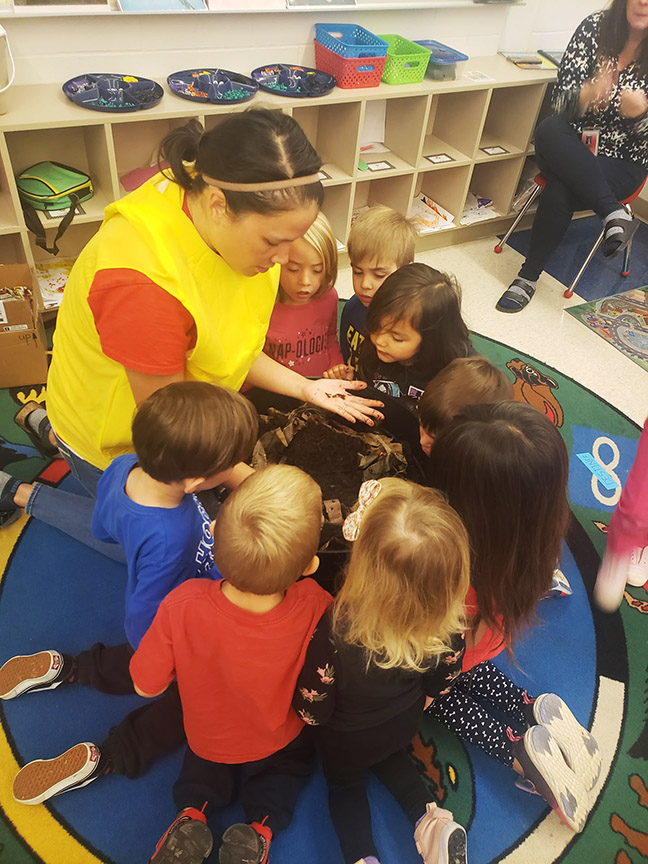
Eel Ground, NB
For the month of October, the K4 (preschool) students of Natoaganeg School have been completing various Zero-Waste challenges. As their Educator, I was inspired to take on a #zerowasteclassroom approach because in our program, we also are a forest preschool. We spend approximately 3 hours of our day outside, rain or shine, and because we spend so much time connecting to nature, I felt it was important that we also give back. Mother Earth gives us so much and it’s super important that we take care of her in return.
So with that in mind, there are a number of changes we have made in our classroom, such as, the use of reusables bowls, plate, cups, forks, spoons, and knives, as well as, water bottles, bar soap, and hand towels (NO MORE PAPER TOWEL). We also us stainless steel straws, cloth tissues, we recycle, and most recently started a worm composter!
Photo Credit: Nicole Matchett, EA (K4, Natoaganeg School)
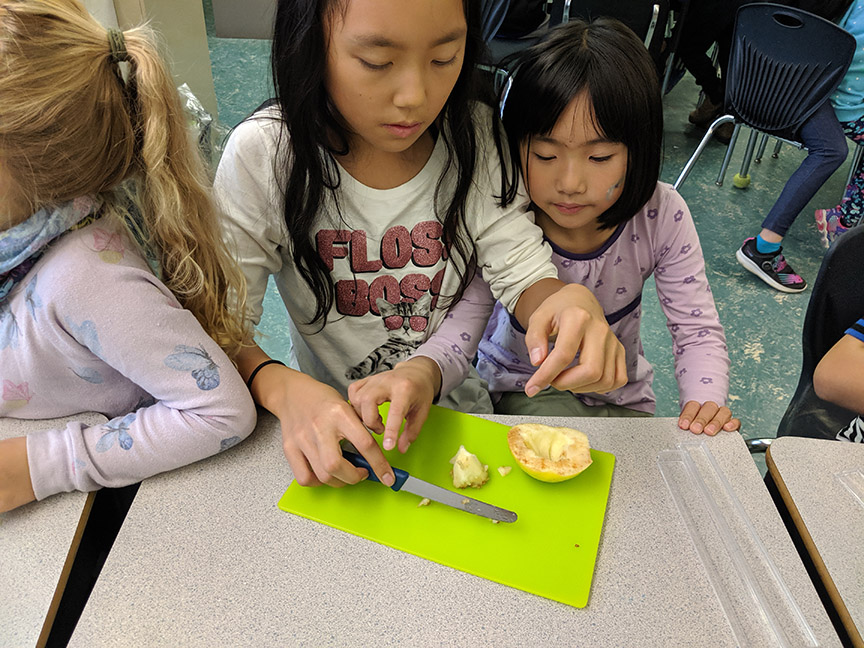
Vancouver, BC
We are hosting a monthly community kitchen where we prepare and share a hot meal together once a month in our grade 1/2 classroom. In addition, the Global Citizens club is putting on a Cavell Zero Waste Air Band showcase. We are using the showcase to highlight the actions we can all take at school to reduce food waste and soft plastic overwrap–snack wrappers.
Photo Credit: Cara Laudon
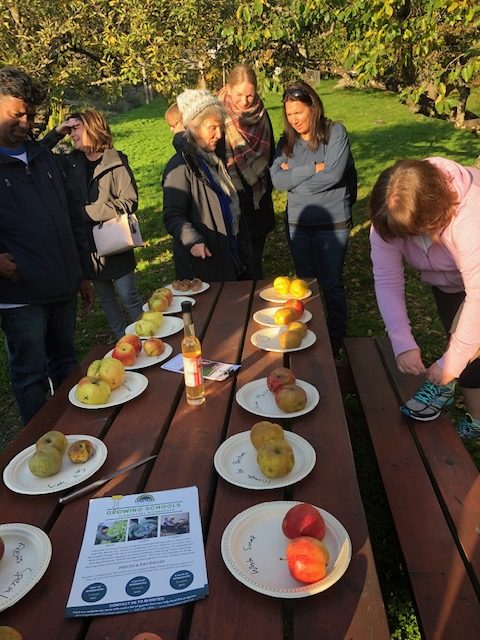
Sooke, BC
We used a multi-tiered approach:
1) Connect with a local NGO to press gleaned apples with Secondary and Nature K students. Show ways to use fruit from the community that would otherwise go to waste.
2) Similar activities with teaching chefs and other educators from across BC, as part of the BCCASA Conference. Educating chefs about gleaning, re-porpusing food, Food Rescue Project, School CSA’s, and feeding food waste to livestock (which is then purchased by school culinary programs).
Photo Credit: Patrick Gale
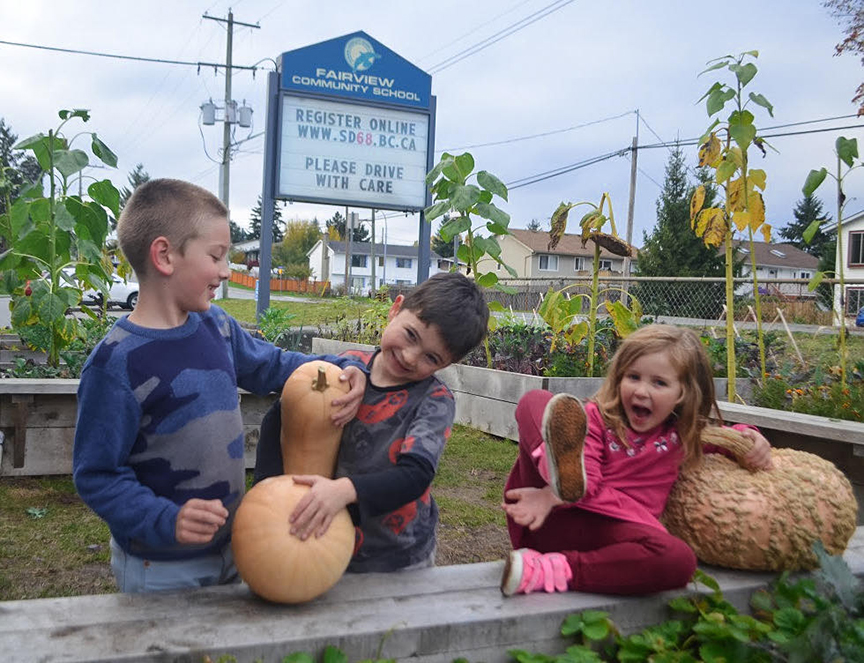
Nanaimo, BC
Our community school volunteers host a weekly scratch soup for students and staff called Souper Wednesday. It was created 20 years ago, by an amazing Community School Coordinator Ms. Manarin, to ensure affordable, healthy lunches were available to all children.
It became a legacy. The program not only nourishes many bodies but continues to build on the school’s strong sense of community. The smell of soup in the hall before lunch gets everyone excited. Now a days, it is run by volunteer parents, caregivers, student teachers and intermediate students. The program has evolved to include good examples of Zero Waste principles. We even expanded our offerings to include smoothie days last spring when the weather warmed up!
Our soup program is proud to be a Zero Waste champion. In our program there are several steps to ensure the least amount of waste is created from farm to fork.
We source produce donations from our local food recovery program and use produce & herbs from our on site gardens. We buy local produce whenever possible. These three steps reduce waste, create hands on learning opportunities and support our local economy.
There is some packaging waste from the grocery store meat/produce and 4L milk jugs. There is always a Vegetarian/Halal option available. We serve our soup in reusable mugs with metal spoons. Our milk is in reusable cups and bread in a napkin. Our food/paper/liquid mix is strained and then composted. Overall, we create almost Zero Waste, we are teaching students food literacy and we are proud of it.
Photo Credit: Nightengales Photography
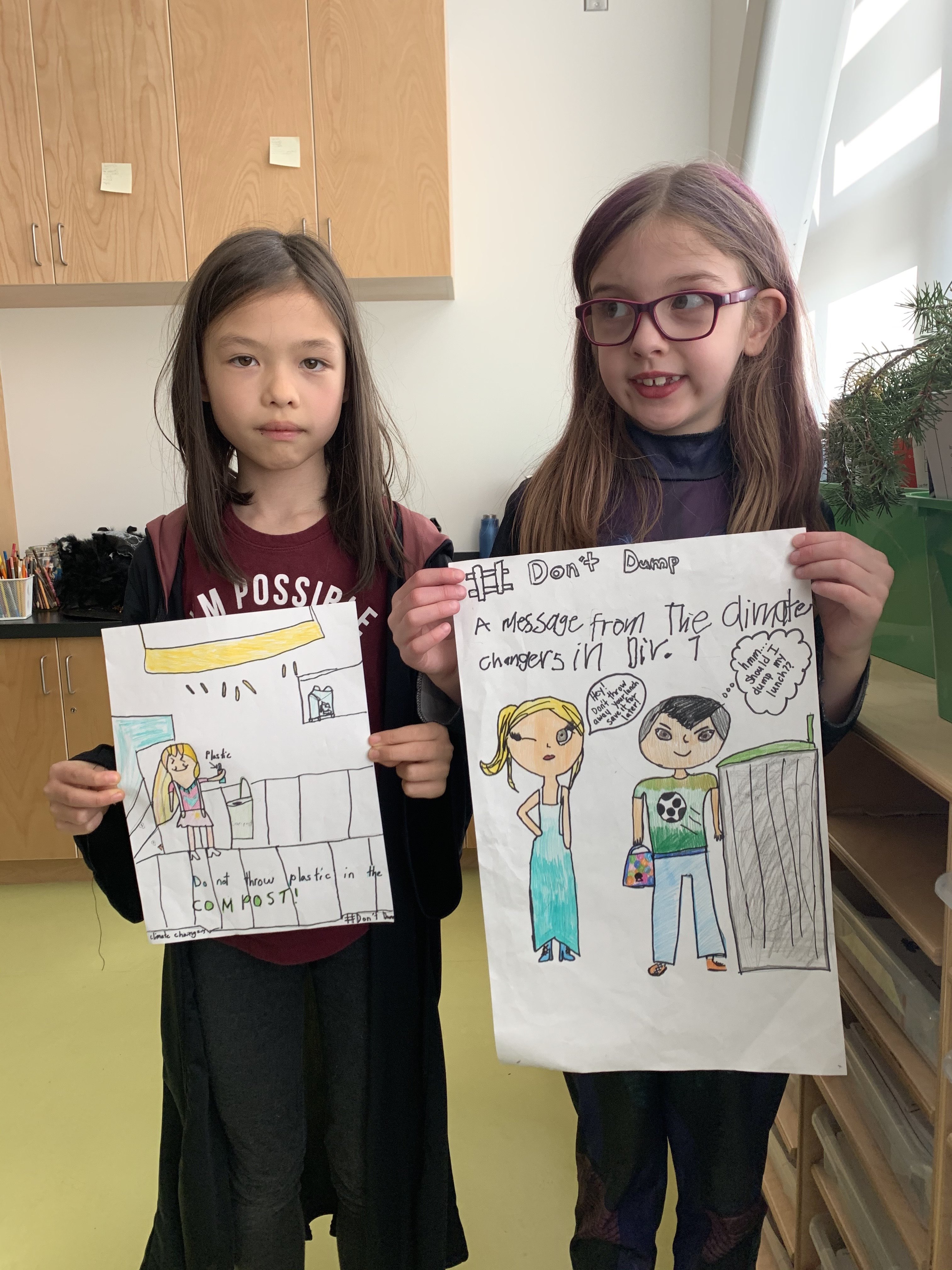
Vancouver, BC
Crosstown Elementary is a new school whose population is learning about sustainable practices. Two grade 3 classes held a food waste audit and then led a teaching assembly on how to use our recycling bins and green waste bins. Our efforts continue as students do mini-lessons in different classrooms.
Photo credit: Deanna Scott
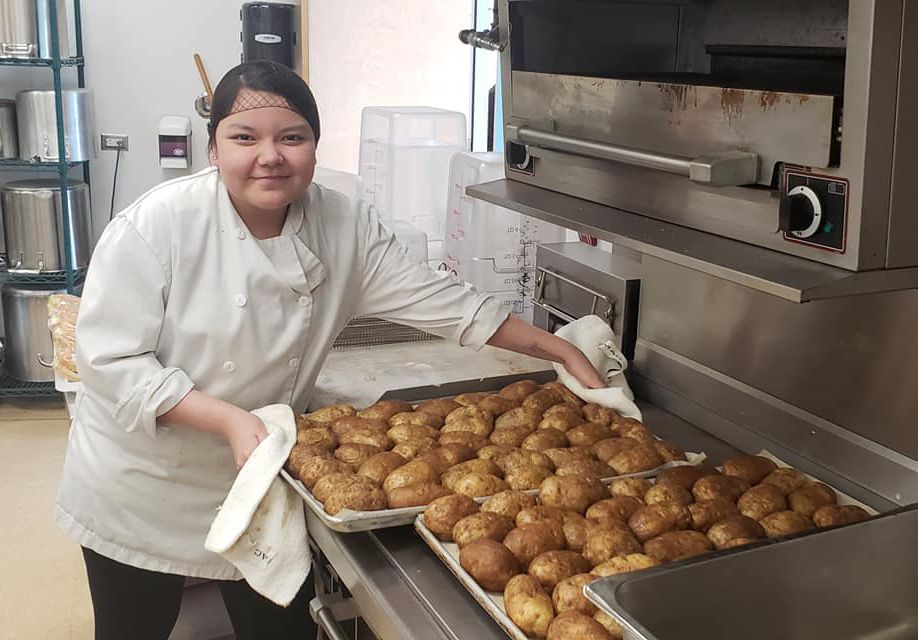
Norway House, MB
While we did not have a good growing season, once again we did have a success story with root vegetables and these pictures show a variety of ways potatoes were utilized by our Culinary Arts Program and served to our student body at lunch. We managed to supply our school from our school garden for the months of September and October, and we still have some left for November. These last pics show potatoes on October 31st.
Every potato used in the school was harvested by hand by students in Doug Braden’s Outdoor Education classes in grades 6-8. They harvested for 7 afternoons.
Photo Credit: Russell Pierce